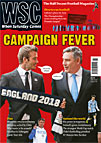 Dear WSC
Dear WSC
In his article on football in film (WSC 278) Rob Hughes quite rightly says that the most convincing football scene ever takes place in Ken Loach’s classic 1969 film Kes. I attended the school that Barry Hines, author of a Kestrel For A Knave, worked in as a teacher. Mr Sugden, while probably never acknowledged by Hines, is clearly based on our old games teacher, Ron “Rocket Ronnie” Hallam. Ron was driven by a will to win at all costs and a classic Ronnie-ism was said to me when I tried out for the school team as an 11-year-old, “goalkeeping’s an art son”. I can still hear him say those words. In fairness to Ronnie he was right. I was never much of a footballer but was occasionally prone to bouts of brilliance. One such example came against Rocket Ron. He was playing a sweeper role when a ball was played forward for me to run on to. I pushed the ball past Ronnie and advanced on goal, easily rounded the full-back and slotted the ball under the advancing goalie. As I wheeled away, delighted with my goal, Ronnie was whistling furiously. He was yelling “offside, offside”. When I said that was rubbish he sent me off for arguing with the ref. Ronnie Hallam may well have been too keen to win at times but he was fantastically knowledgeable about football and cricket, and we didn’t waste much time on cross-country running. Some of Ronnie’s protégés went on to play professionally – the Shirtliff brothers turned out for Sheffield Wednesday among others and Steve Shutt played for Barnsley. Ian Swallow passed up football for a pretty successful cricketing career with Yorkshire. I guess one big disappointment was that Ronnie’s son, Matthew, never reached those heights. Rocket Ronnie though. A living legend.
John Hague, Leicester
Read more…
 Joel Richards reports on the continuing difficulties in controlling Argentinian groups, both inside and outside the country
Joel Richards reports on the continuing difficulties in controlling Argentinian groups, both inside and outside the country